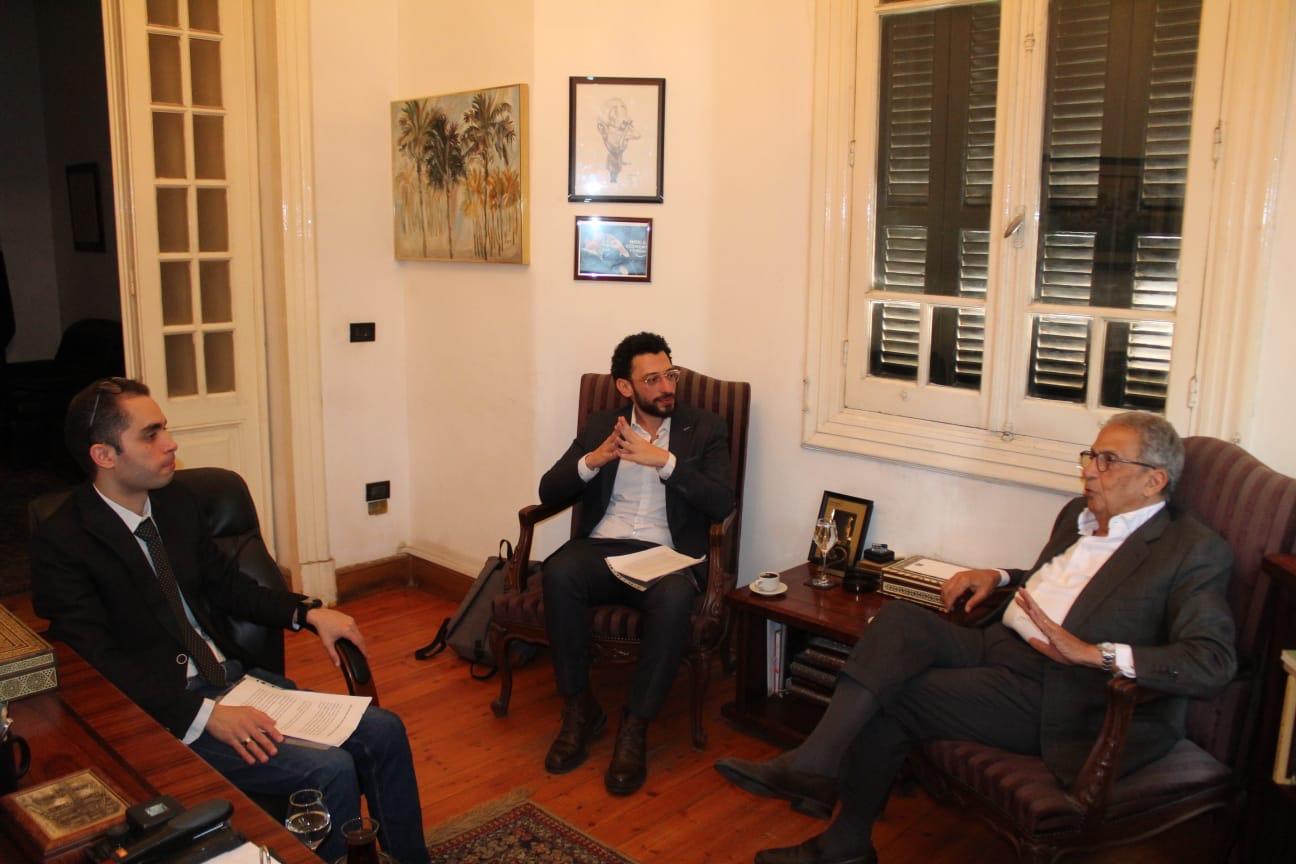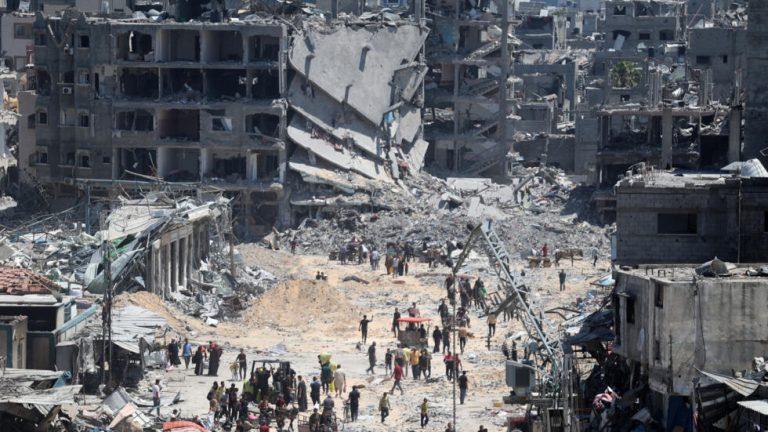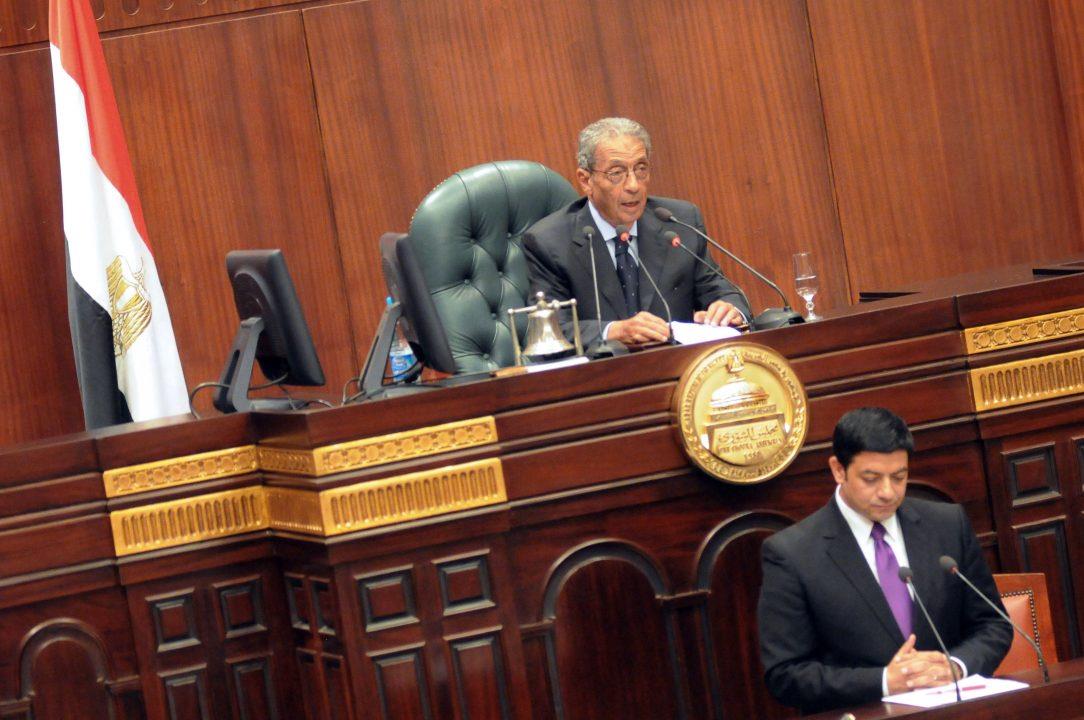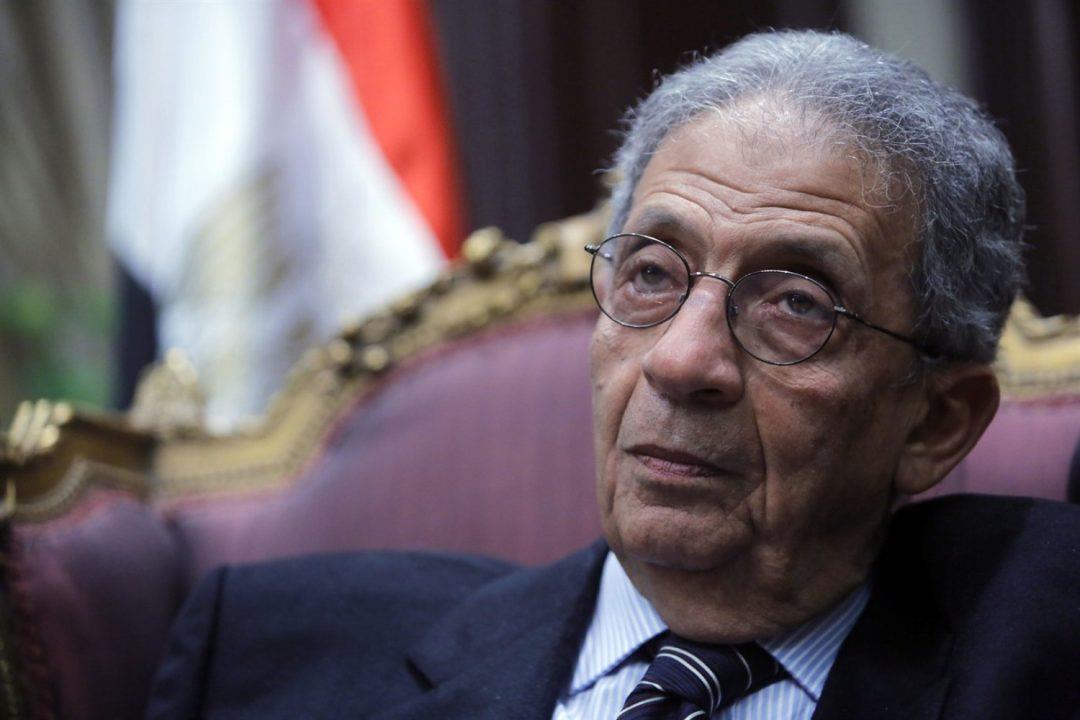
Amre Moussa On Egypt-Israel Peace Treaty: Not A Document To Be Brandished
Moussa served as Egypt's Minister of Foreign Affairs and later as Secretary-General of the Arab League, Moussa's strategic acumen and diplomatic finesse have left an indelible mark on the region's political landscape.
By Mohamed Samir and Taha Sakr
Can you elaborate on the complexities surrounding the Palestinian issue and its recent developments, particularly in light of the October 7th attacks?
To fully grasp the recent developments, it's essential to understand the historical context of the Palestinian issue. For a long time, Israel, with the support of several major powers, has managed to marginalise the Palestinian cause, often avoiding substantive discussions on military occupation and resistance. This superficial approach has led to significant complications. The belief that the issue could be sidelined was fundamentally flawed, as it ignored the deep-rooted and complex nature of the conflict.
How did the October 7th attacks alter this landscape?
The attacks on October 7th marked a critical turning point. Initially, Israel and many Western nations attempted to frame the attacks as acts of terrorism against Israel, thereby justifying Israel's right to self-defence. However, this narrative was quickly contested. The events exposed Israel's vulnerabilities and brought to light the broader injustices of its policies, challenging the simplified portrayal and sparking a re-evaluation of the situation.
What is the broader significance of these attacks on the Palestinian resistance, both in terms of perception and the ongoing conflict?
These attacks have shattered the carefully constructed image of Israel as a bastion of strength and democracy, exposing it for what it truly is: an occupying and oppressive force. The Palestinian people's resolute refusal to accept humiliation and normalisation efforts has ignited a renewed spirit of resistance against occupation, further undermining Israel's narrative.
How did Israel's initial assessment and subsequent response to these developments unfold?
Israel, initially blinded by arrogance, gravely underestimated the magnitude of the situation. It assumed that any repercussions would be minimal and easily contained, even viewing the attacks as an opportunity to justify further aggression and displacement of Palestinians in Gaza. This stems from Israeli baseless belief of Arabs being“incompetent deadbeats.”
What role did Egypt and Jordan play in shaping the response to these events?
Egypt and Jordan's firm rejection of the exodus of Palestinians went beyond logistical or security concerns. Their stance was deeply rooted in an understanding of the dangerous historical precedent such actions would set. This principled position, coupled with an understanding from the United States, caught Israel off guard and challenged its assumptions about the regional landscape.
How do you view the broader implications of these events for the Palestinian cause and regional dynamics?
These events have served as a powerful testament to the resilience of the Palestinian people and the futility of superficial or cosmetic solutions. They have reignited global attention to the Palestinian issue and exposed Israel's vulnerabilities. Furthermore, they have disrupted traditional power dynamics in the region, forcing a reassessment of long-held assumptions. The Palestinian cause has been reinvigorated, and the geopolitical landscape has been fundamentally altered.
In light of Israel's intention to displace Palestinians in Gaza, what actions can be anticipated from individual Arab states and the Arab League as a whole?
The nascent response is already evident in Egypt's intervention in support of South Africa's legal case against Israel before the International Court of Justice. This, along with the mounting international criticism of Israel and the perceptible shifts in Western policies, suggests a multifaceted approach is in development. There is also an increasing focus on the potential“Day After” scenario, with discussions on a global scale exploring the ramifications and future trajectory of this issue.
To address the question of“what lies ahead,” we must first establish a fundamental principle: the unequivocal right of Palestinians to a sovereign, independent state. This principle, however, faces reluctant opposition from the American side due to Israel's dissent, manifested in a decision by the current Israeli government, ratified by the Knesset, rejecting the prospect of a Palestinian state.
Reflecting on past negotiations, particularly those of the 1990s between Palestine and Israel under Egyptian and subsequent Arab oversight, highlights the perceived pragmatism at that time in commencing with incremental steps. The narrative of establishing a Palestinian state warranted separate consideration as a distinct dossier, calling it“Final Status issues.”
This meant that negotiations were to be divided into two parts, the first concerns the present scenario and tangible realities of daily coexistence, and the second part (establishment of a Palestinian state) is to be discussed later at the end of negotiations. After five years of negotiations, it has become evident that this concept was merely a political fraud.
Accordingly, now recognizing the Palestinian people's entitlement to their independent state, with Jerusalem as their capital, must underpin contemporary political deliberations. Any protraction must be rebuffed, and emphasis redirected towards concrete action in pursuit of this objective.
We advocate for commencing by reaffirming that our initiative is centred on the establishment of a Palestinian state on the 1967 borders and a security framework safeguarding all citizens. Subsequently, deliberations can delve into specifics. We do not commence with intricacies and then arrive at the concept of the state, but rather, the state forms the bedrock. This approach facilitates agreements on all fronts, encompassing land allocation, security arrangements, water resources, and daily inter-state relations.
Once we collectively acknowledge the Palestinian people's right to their state, with Palestine as our recognized state and a member of the United Nations, we can then address the finer details. What we are undertaking, as a state, is recognition of the Palestinian state, acknowledging the Palestinian people's right to establish their state on territories occupied since June 4, 1967, with Eastern Jerusalem as its capital. Subsequent negotiations will tackle all the minutiae concerning ongoing relations, water resources, agriculture, and security.
This initial stride towards any conceivable political horizon mandates an appraisal of what the immediate future holds. Foreseen are potential shifts in the foreign policies of European and Latin American nations, alongside Asian and African states, where many are poised to endorse this concept. A notable vote in the General Assembly saw 143 out of 193 countries affirming the resolution we advocate, representing a substantial percentage of member states.
Some say that a real Palestinian state can not be established, taking into consideration the changes that Israel made on the ground over the years, with the illegal settlements in the West Bank What strategies, in your view, would be most effective in achieving this goal, and what role can international mobilisation and cooperation play in overcoming these obstacles?
If we dismiss the possibility of the establishment of the Palestinian state, then that means that resistance will continue and the region will be devoured by bloody instability. This will lead to 8 October, 9 October and more to follow.
The Palestinian people continue their steadfast resistance in pursuit of their national and human rights. However, the current situation necessitates a reassessment of our approaches to align with the evolving global context. Thinking that we can go back to the pre-seventh of October is a nihilistic approach, that the region and the world can not live with its consequences.
The recognition of the Palestinian people's right to self-determination and an independent state is paramount for peace and stability in the region. The unwavering support of Arab, Islamic, and friendly nations is crucial in this endeavour. It is important to acknowledge that the ongoing Israeli occupation and its policies significantly impede the establishment of a Palestinian state. This reality highlights the critical need for a paradigm shift and sustained international efforts to champion the rights and aspirations of the Palestinian people.
Israel should have no veto on the establishment of the Palestinian state. The international community should not allow the existence of such a veto.
Let us notice that Israel moved tens of thousands of northern colonies (settlements) after attacks from Hezbollah. This could be done to the rest of those illegal settlements.
What are your thoughts on the recent Israeli actions in Rafah and along the Philadelphi Corridor, particularly in light of the Egypt-Israel peace treaty?
Israel's recent actions in Rafah and the Philadelphi Corridor are a continuation of its colonial and racist policies, rooted in outdated assumptions about Arab weakness and susceptibility to coercion. This approach is no longer viable in the modern world and the emerging new Middle East.
Regarding Rafah, the Israeli Foreign Minister has accused Egypt of hindering the exit of Palestinians by closing the border crossing. While Egyptian Foreign Minister Sameh Shoukry has addressed these accusations, it's important to understand the broader context.
Israel's claim suggests that Egypt's closure of the Rafah crossing is the primary cause of Palestinian suffering. This is a misrepresentation. Egypt's closure is not designed to block aid or essential goods, as Israel implies. Rather, it is a deliberate measure to prevent forced displacement and protect Palestinian rights.
While Israel attempts to shift blame onto Egypt, the reality is that Israel's actions are the root cause of Palestinian suffering. Egypt refuses to be a party to the oppression of the Palestinian people.
Do Israel's recent provocations, and their impact on the peace treaty with Egypt, suggest Netanyahu is making sound decisions by opening multiple fronts, particularly with Egypt?
The recent actions by Israel don't necessarily or clearly indicate a deliberate attempt to undermine the peace treaty with Egypt. Instead, they are likely part of a broader strategy driven by complex geopolitical considerations. However, Netanyahu must be mindful of the potential risks associated with any actions that could strain the peace treaty. Returning the region to a state resembling 1973 would harm“all parties” involved.
In today's world of transparency and progress, any attempt to manipulate the peace treaty would be met with strong disapproval and consequences. Netanyahu's approach appears focused on managing international optics and deflecting attention from domestic issues, rather than risking a confrontation that could leave Israel further isolated on the diplomatic stage.
In Egypt, there is a clear commitment to upholding the existing peace framework in the region. Therefore, while Israel's actions might test the limits of the peace treaty, they are – so far – unlikely to alter the overall trajectory of peaceful relations in the region, that should be based on justice and reciprocal commitments.
Recent reports, particularly in the US media, have suggested that Egypt is openly threatening to freeze the peace treaty or diplomatic and economic relations with Israel as a means of applying pressure. What is your assessment of this situation?
The concept of pressure is inherently reciprocal. However, I believe the issue surrounding the Israeli-Egyptian peace treaty is far too serious to be addressed in superficial media debates. This matter carries significant and multifaceted repercussions that extend far beyond a bilateral dispute between Egypt and Israel. It's crucial to recognise that the peace treaty is not merely a document to be brandished whenever tensions arise. It is deeply intertwined with vital strategic interests that encompass regional and international balances.
What are the leverage points that Egypt could use against Israel?
Egypt has several leverage points, most notably our unwavering opposition to forced displacement – a stance shared by the United States. Egypt will not waver on this issue. Those who underestimate Egypt's resolve should reconsider. We are not a nation that will tolerate external pressures or assaults on our strategic interests without a firm response. If Egypt were to erupt due to such actions, the ensuing escalation would benefit no one.
Let's not forget Egypt's decisive action to halt the Muslim Brotherhood's rule. Egypt's intervention was swift and effective, quickly resolving the situation. While efforts at the time focused on supporting stable governance, our intervention decisively thwarted Western attempts to legitimise Brotherhood rule, especially in light of their failure in governance.
Egypt has the power to halt policies that could lead to further disasters, not just in Egyptian-Israeli relations, but regionally as well. Our ability to influence and shape events within the region should not be underestimated. Any escalation resulting from pressure or threats to Egypt's interests would not be in anyone's best interests.
Could you elaborate on the measures Egypt might employ to exert pressure on Israel?
Egypt possesses a range of diplomatic, economic, and strategic tools that could be leveraged to influence Israeli actions.
Diplomatically, Egypt could intensify its engagement within international forums and organisations to garner support for its positions on the peace treaty and the Israeli-Palestinian conflict. This could encompass lobbying efforts, diplomatic initiatives, and public diplomacy campaigns aimed at shaping international opinion.
Economically, Egypt could consider measures such as in the field of investment policies, and the perceived regional economic cooperation plans.
Strategically, there is a lot to be said and done. This is a file by itself that would be tackled in a separate interview.
How can Arab states, especially Egypt, address Iran's growing influence in the region and its adverse effects?
Egypt, comparable in size and influence to Iran and Turkey, plays a key role in the region. In this connection, Egypt and Saudi Arabia would together form a substantial force countering Iranian and other regional ambitions.
Unlike some regional neighbours, Egypt doesn't face Sunni-Shiite sectarian issues with Iran. Historically, relations have been strong, exemplified by the Shah of Iran's marriage to the Egyptian king's sister, under the auspices of the Grand Imam of Al-Azhar.
The crux of the issue lies in Iran's regional policies and support for destabilising movements. Their proclaimed rule over four Arab capitals underscores these ambitions and escalates tensions. Significantly, Iran and Israel remain the only two states in the region that have not recognised the Arab Peace Initiative.
For Iran to re-establish positive relations with the Arab world, it should recognise the Arab Initiative and genuinely embrace the two-state solution based on the June 5th lines. This would pave the way for regional understanding and cooperation.
Egypt, with its considerable size and influence, is committed to working with its Arab partners to maintain regional stability. Our partnership with Saudi Arabia is a strategic step in reinforcing the collective power of Arab states to address regional challenges and maintain a balanced peace in the region.
Egypt's role extends beyond its physical size. We wield significant influence and soft power capable of shaping regional dynamics. We are committed to enhancing this role to serve the interests of the entire region. The challenges we face demand ongoing cooperation and coordination among Arab states. I believe that Egypt stands ready to fulfil its part.
In what ways does Egypt's approach to regional issues, notably in Syria, Yemen, Lebanon and Iraq, diverge from Iran's?
Egypt and Iran's approaches to regional issues, particularly in the complex theatres of Syria, Yemen, Lebanon, and Iraq, are notably divergent.
Iran has often been characterised by a confrontational stance, extending support to proxy groups within these nations. Conversely, Egypt's approach is more nuanced, seeking inclusive solutions. Rather than escalating tensions through proxy conflicts, Egypt aims to understand the root causes of instability, striving for constructive resolutions that serve the interests of all stakeholders, especially the legitimate Arab interests.
This approach underscores Egypt's dedication to regional stability and its conviction in the power of dialogue and diplomacy as conflict resolution tools.
In light of the ongoing crisis in Sudan, could you elaborate on the complex challenges facing the nation and potential pathways to resolution?
The crisis in Sudan is undeniably intricate, stemming from a confluence of deep-rooted political, economic, and social factors. Decades of mismanagement under previous regimes have left the country grappling with instability and unrest. To forge a path towards resolution, it is imperative to acknowledge Sudan's sovereignty and unique historical context, recognising that sustainable solutions must be tailored to the nation's specific circumstances.
Crucially, international collaboration and support are vital in empowering the Sudanese people to overcome this crisis and rebuild their nation. Egypt, in particular, advocates for a holistic approach that not only addresses the immediate humanitarian needs but also tackles the underlying causes of the conflict. This includes fostering inclusive dialogue, promoting national reconciliation, and supporting Sudan's efforts to establish stable governance structures.
Ultimately, a lasting resolution to the Sudanese crisis hinges on a combination of national resilience, regional cooperation, stopping foreign colonial intervention and unwavering international commitment to the well-being of the Sudanese people is in dire need.
In my opinion, the solution in Sudan is to maintain civil rule, a strong army, and a more African and Arab stabilising role.
In light of recent geopolitical shifts, such as France's withdrawal from certain African countries, and emerging voids in regional influence, how does Egypt see its role in Africa evolving? Does Egypt view these developments as an opportunity to expand its own influence in the region?
Egypt's role in Africa is multifaceted and deeply rooted in history. While geographically located in North Africa, we consider ourselves an integral part of the African continent, with longstanding cultural and economic ties to our neighbours. As the geopolitical landscape shifts. I believe that Egypt is committed to strengthening its regional engagement with countries across the Sahel, the Horn of Africa, and East Africa.
We view recent developments, including the changing dynamics in regional influence, as an opportunity to foster closer cooperation with our African partners. This includes expanding diplomatic ties, deepening economic partnerships, and promoting cultural exchange programmes. Through these efforts, Egypt, of course, aims to contribute to stability and sustainable development throughout Africa.
This approach is based on a shared vision for a prosperous and secure Africa, where countries work together to address common challenges and seize opportunities for growth. I believe that by leveraging our unique position and historical connections, Egypt can play a constructive role in shaping the future of Africa, in partnership with other nations on the continent.
What are your views on the recent significant transformations in Saudi Arabia?
The transformative developments within Saudi Arabia under King Salman and Crown Prince Mohammed bin Salman have garnered significant attention both domestically and on the world stage. The Kingdom has embarked on a path of change, particularly evident in societal and political spheres, marking a new era for the nation.
Internationally, Saudi Arabia's approach to engagement and partnerships has evolved. The recent Iranian-Saudi agreement brokered under the Chinese initiative stands as a notable example, drawing widespread positive responses. However, some have connected recent events, such as the October 7th resistance movement and the halt in normalisation efforts with Israel, to these broader shifts.
I never thought that Saudi Arabia would normalise relations with Israel without a quid pro quo in accordance with the Arab peace initiative.
Overall, my perspective on these developments in Saudi Arabia is optimistic. They signal progress and a forward-thinking leadership that is willing to address challenges and embrace change in the 21st century.

Legal Disclaimer:
MENAFN provides the
information “as is” without warranty of any kind. We do not accept
any responsibility or liability for the accuracy, content, images,
videos, licenses, completeness, legality, or reliability of the information
contained in this article. If you have any complaints or copyright
issues related to this article, kindly contact the provider above.





















Comments
No comment